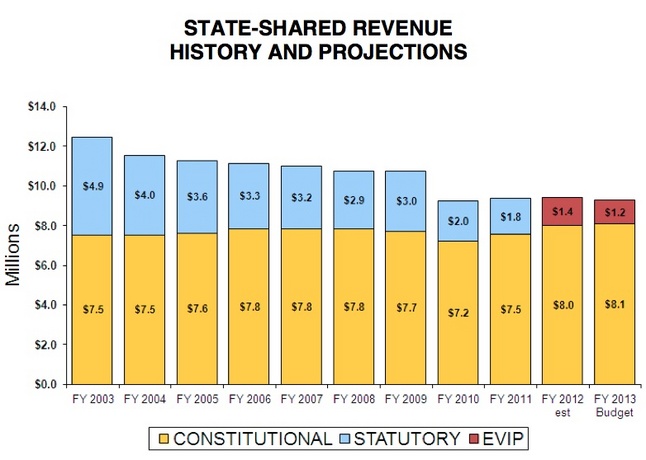Ann Arbor's lament: Where lawmakers have discretion, state has cut funding for local government

There are two types of state-shared revenue to local governments in Michigan — that which is guaranteed in the state constitution from the state's 6 percent sales tax, and that which is statutory or up to the discretion of state lawmakers in Lansing. The latter has been going down for years. This chart shows Ann Arbor's receipts from the state since 2003.
Source: City of Ann Arbor
City Administrator Steve Powers and Tom Crawford, the city's chief financial officer, have clarified the matter, and apparently both statements stand.
That's because there are two types of state-shared revenue to local governments in Michigan — that which is guaranteed in the state constitution from the state's 6 percent sales tax, and that which is statutory or up to the discretion of state lawmakers in Lansing.

City Administrator Steve Powers
Ryan J. Stanton | AnnArbor.com
On the other hand, Powers said, revenue sharing distributed according to the constitution has increased for Ann Arbor because its population has remained steady and sales activity in the state has improved. Under the state constitution, revenue sharing is distributed to cities, villages, and townships based on the local government's population.
Crawford said Ann Arbor's share guaranteed under the constitution has grown each of the last few years from $7.2 million in 2010 to $7.5 million in 2011 to $8 million in 2012, and he expects that trend to continue.
But at the same time, the discretionary amounts, which the governor and Legislature have control over, have dropped from $2 million in 2010 to $1.8 million in 2011 to $1.4 million in 2012.
The roughly $400,000 drop in funding for Ann Arbor this past year came under Gov. Rick Snyder's new Economic Vitality Incentive Program, which replaced the state's statutory revenue sharing system with a program where cities now compete for a smaller pot of money.
Under the new program, cities are eligible to receive roughly two-thirds of the statutory payments they used to get if they show they're making progress in three areas: accountability and transparency, consolidation of services and employee compensation.
Since those incentives were announced, the city has launched a new interactive website called A2OpenBook, consolidated dispatch operations with the county, entered into talks with Ann Arbor Township about merging fire departments and gotten concessions from some of its largest labor unions, including the police officers, firefighters and AFSCME.
Ann Arbor watched its combined revenue sharing payments from the state fall from more than $14 million over a decade ago to about $9.2 million in 2010. That roughly $5 million drop led to city service reductions and dozens of job eliminations, including many in the area of public safety.
The declining revenue also led the city to consider options such as a local income tax, which would expand the tax base by skimming off the paychecks of tens of thousands of non-residents who work in Ann Arbor. Some also have voiced interest in a local sales tax.
But for now, the city's budget looks like it's in good shape for the next fiscal year. Crawford projects a $1.3 million surplus ahead, and he has revised his projections for state revenue sharing.
Total revenue sharing payments to Ann Arbor — combining the guaranteed and discretionary amounts — ticked up to $9.3 million in 2011 and to $9.4 million in 2012. Crawford now anticipates it'll be closer to $9.8 million combined in 2013 due to expected increases in the constitutional portion.
But looking forward, Crawford said, he hasn't seen anything to suggest the Legislature intends to adjust the EVIP pool consistent with sales tax receipts like the constitutional portion does.
Snyder and his administration also are pushing for the phased-in elimination of the state's personal property tax, which businesses pay on equipment. For Ann Arbor, that would equal an estimated $257,573 in lost general fund revenue next year, ramping up to $417,409 by fiscal year 2016-17 — a total loss of more than $1.4 million during the next four fiscal years.
Sara Wurfel, a spokesman for Snyder, could not be reached for comment.
The Michigan Senate voted 23-14 in favor of scrapping the personal property tax on manufacturers Wednesday night, sending the bill back to the state House before it can go to Snyder. Ryan J. Stanton covers government and politics for AnnArbor.com. Reach him at ryanstanton@annarbor.com or 734-623-2529. You also can follow him on Twitter or subscribe to AnnArbor.com's email newsletters.


Comments
Bridget
Tue, Dec 18, 2012 : 4:42 p.m.
The city needs to look at overall taxation for classes of citizens and figure out ways to equalize the burden. Headlee, State pension tax, elimination of ppt over time, etc., must all be figured into any decision, while remembering the pitfalls of each type of taxation. Sales tax falls during recession. Pension tax will fall as new public employees are prohibited from joining and existing pensioners die off. A city income tax is resented by non-residents, and didn't save Detroit. Ann Arbor needs to adjust, spend less than it makes, and do what it can to garner favorable State tax policy.
Veracity
Sun, Dec 16, 2012 : 1:07 p.m.
Ryan, nice bar graph of "State-Shared Revenue History and Projections." Can you list the source for the numbers? Thanks.
Veracity
Sun, Dec 16, 2012 : 12:59 p.m.
According to "BLS current population survey (CPS)" Michigan had 427,328 unemployed in October 2012, after achieving a low point of 388,907 in April. http://www.deptofnumbers.com/unemployment/michigan/ As more people become re-employed medicaid expenditures will decline. Unfortunately, Governor Snyder and the Republican legislature has been far too busy attacking women's rights and union rights than to put together any meaningful re-employment plan. The decline in discretionary state funds to municipalities is Governor Snyder's effort to weaken municipal finances so that more local governments become eligible for an Emergency Financial Manager (EFM). Most of the local governments assigned an EFM are run by Democrats which Rick Snyder is out to destroy. This was illustrated by a feature of the defeated PA4 law that prohibited local officials removed from office by the assigned EFM to run for office for five years after the EFM leaves the municipality. I do not know if the prohibition exists in the new law.
DonBee
Sat, Dec 15, 2012 : 7:03 p.m.
This is an issue that starts at the top, not the top of the state government but the top of the federal government. Unfunded federal mandates for medicare and medicaid are both rising, as are other federal mandates on the state. When the state has to cover for federal shortfalls, then the state has less to provide to local governments. If you are angry, be angry at Washington.
Veracity
Sun, Dec 16, 2012 : 1:16 p.m.
Please enumerate the "unfunded mandates" for medicare and medicaid. Certainly since the state of Michigan can do more to reduce its unemployment rate then the state government has at least a moral responsibility to assist in financial support of the unemployed. Why should the rest of the nation have to pick up the tab for failure of the Michigan state government?
4Bells
Fri, Dec 14, 2012 : 3:30 p.m.
While corporate profits soar to historical, all-time highs, this administration continues to fund more business incentives at significant cost to the rest of us: Higher taxes, cuts to pay and benefits, reduced revenue sharing to municipalities and insidious shifting of state revenues at every turn from Michigan's citizens to the corporate private sector. In the meantime, we're still awaiting all of those new jobs - and some revelation as to how all this corporate favoritism somehow benefits those of us who continue to sacrifice in order to fund this unprecedented business prosperity................
Stephen Lange Ranzini
Fri, Dec 14, 2012 : 11:50 a.m.
@snapshot: Why would Ann Arbor need a city income tax? The City of Ann Arbor had a surplus of $29,981,953 in it's 2011 fiscal year ended June 30, 2011, and one of the approx. 56 separate accounts ("buckets") owned by the city, the general fund, had a surplus of $950,000. All the money in the approx. 56 separate buckets is owned by the city and are part of the annual audited financial statement (CAFR). See the table on page 14 ("Increase in net assets = profit for the year) of the city's CAFR report. Of note, 2010's adjusted annual net income was $29,561,525, so the city's total net income year over year rose about $320,000. Despite running up a $600 million debt, and despite the state cutting revenue sharing, the city still would have the resources to properly fund basic services (police, fire, roads, etc.) if its liquid resources were not trapped in the 56 buckets. Drain the buckets!
Carole
Fri, Dec 14, 2012 : 11:46 a.m.
As per individual who stated we need local taxes -- I say NO to any taxes of any kind. When all taxes are added up, I do believe I work for the city, state, and federal at least 5 mos out of the year with the rest of the year being my own income. The city can make cuts that would help their budget by closing DDA and returning funds that are used for art back to their original funding areas. Times are tough, so pull in the spending belt.
snapshot
Fri, Dec 14, 2012 : 5:07 a.m.
We need a city income tax for many reasons. It's time leadership quit pandering to the U of M and start exhibiting leadership qualities by securing appropriate revenues for the city. A lot of leadership "cronies" don't like the idea of a city income tax but residents are getting tired of the endless property tax millages being used to free up general fund dollars. Get an income tax measure on the ballet. the U of M keeps buying city properties and eliminating from the tax base. It's time for council to get real creative in revenue generation.....increased fees and property taxes are not "creative".
John Q
Fri, Dec 14, 2012 : 12:27 a.m.
All local governments have been cut. Some townships get no EVIP dollars.
dotdash
Thu, Dec 13, 2012 : 9:55 p.m.
Has the state cut all local governments equally? Or is there some municipalities where the blue and red parts of that graph have been growing?
motorcycleminer
Thu, Dec 13, 2012 : 8:42 p.m.
What no extra state pork...no art ...Oh woe is me...what is OZ to do ..Dorthy , Toto help ...